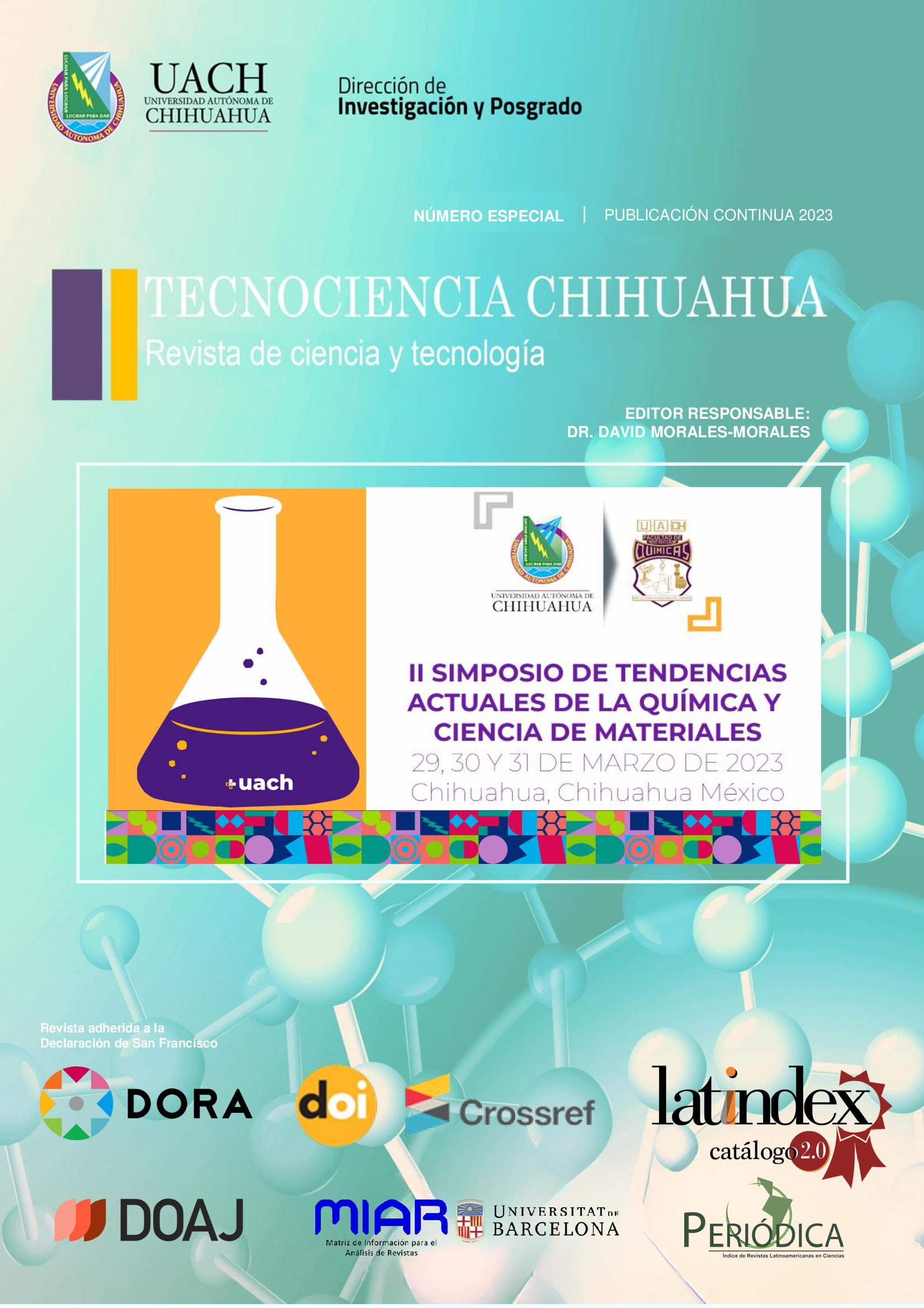La terapia fotodinámica promete revolucionar el tratamiento del cáncer
Photodynamic Therapy Promises to Revolutionize Cancer Treatment
DOI:
https://doi.org/10.54167/tch.v17i4.1355Palabras clave:
cáncer, fotoquímica, fotosensibilizador, metales, quimioterapiaResumen
El cáncer es una de las enfermedades que más afecta a la población mundial. Los tratamientos más aplicados son la cirugía, la radioterapia y la quimioterapia. La quimioterapia consiste en el uso de fármacos para destruir las células cancerosas. Sin embargo, puede presentar baja eficiencia, resistencia al tratamiento, y debido a la falta de selectividad del fármaco, provocar efectos secundarios severos. Debido a estas limitaciones, han surgido terapias emergentes, como la terapia fotodinámica (PDT, por sus siglas en inglés). La PDT consiste en administrar al tumor un fotosensibilizador (PS, por sus siglas en inglés), el cual es posteriormente estimulado con una fuente de luz y se producen especies reactivas de oxígeno tóxicas para las células. La PDT ofrece una mayor selectividad hacia las células cancerosas ya que el fotosensibilizador puede inyectarse y activarse de manera localizada y de esta manera no afectar a otros órganos cercanos. Se espera que la PDT en un futuro cercano pudiera ser una terapia valiosa para el tratamiento del cáncer y permitir una mejora en la calidad de vida de los pacientes.
Descargas
Citas
Agostinis, P., Berg, K., Cengel, K. A., Foster, T. H., Girotti, A. W., Gollnick, S. O., Hahn, S. M., Hamblin, M. R., Juzeniene, A., Kessel, D., Korbelik, M., Moan, J., Mroz, P., Nowis, D., Piette, J., Wilson, B. C., & Golab ,J. (2011). Photodynamic therapy of cancer: an update. CA: A Cancer J. Clinicians, 61: 250–281. https://doi.org/10.3322/caac.20114
Algorri, J. F., Ochoa, M., Roldán-Varona, P., Rodríguez-Cobo, L., & López-Higuera, J.M. (2021). Light technology for efficient and effective photodynamic therapy: a critical review. Cancers, 13: 3484. https://doi.org/10.3390/cancers13143484
Bazylińska, U., Pietkiewicz, J., Saczko, J., Nattich-Rak, M., Rossowska, J., Garbiec, A., & Wilk, K. A. (2012). Nanoemulsion-templated multilayer nanocapsules for cyanine-type photosensitizer delivery to human breast carcinoma cells. Eur. J. Pharm. Sci., 47: 406–420. https://doi.org/10.1016/j.ejps.2012.06.019
Bellnier, D. A., Greco, W. R., Loewen, G. M., Nava, H., Oseroff, A. R., & Dougherty, T. J. (2006). Clinical pharmacokinetics of the PDT photosensitizers porfimer sodium (photofrin), 2-[1-hexyloxyethyl]-2-devinyl pyropheophorbide-a (photochlor) and 5-ALA-induced protoporphyrin IX. Laser Surg. Med., 38: 439-444. https://doi.org/10.1002/lsm.20340
Brown, S. B., Brown, E. A., & Walker, I. (2004). The present and future role of photodynamic therapy in cancer treatment. Lancet Oncol., 8: 497–508. https://doi.org/10.1016/S1470-2045(04)01529-3
Calzavara-Pinton, P. G, Venturini, M., & Sala, R. (2007). Photodynamic therapy: update 2006. Part 1: Photochemistry and photobiology. J. Eur. Acad. Dermatol Venereol., 3: 293-302. https://doi.org/10.1111/j.1468-3083.2006.01902.x
Castano, A. P., Demidova, T. N., & Hamblin, M. R. (2004). Mechanisms in photodynamic therapy: part one-photosensitizers, photochemistry and cellular localization. Photodiagnosis Photodyn Ther., 4: 279-93. https://doi.org/10.1016/S1572-1000(05)00007-4
Chen, J., Fan, T., Xie, Z., Zeng, Q., Xue, P., Zheng, T., Chen, Y., Luo, X., & Zhang, H. (2020). Advances in nanomaterials for photodynamic therapy applications: status and challenges. Biomaterials, 237: 119827. https://doi.org/10.1016/j.biomaterials.2020.119827
Colin P., Estevez, J. P., Betrouni, N., Ouzzane, A., Puech, P., Leroy, X., Biserte, J., Villers A., & Mordon, S., (2011). Photodynamic therapy and prostate cancer. Progrès en Urologie, 21: 85-92. https://doi.org/10.1016/j.purol.2010.07.018
Correia, J. H., Rodrigues, J. A., Pimenta, S., Dong, T., & Yang, Z. (2021). Photodynamic therapy review: principles, photosensitizers, applications, and future directions. Pharmaceutics, 9: 13. 1332. https://doi.org/10.3390/pharmaceutics13091332
Cosa, G., Nonell, S., Aubry, J. M., Anquez, F., Kanofsky, Fresnadillo, J. D., Ogilby, P., San Román, E., Frochot, C., & Geddes, C. (2016). Singlet oxygen: applications in biosciences and nanosciences. Royal Society of Chemistry. https://search.worldcat.org/es/title/singlet-oxygen-applications-in-biosciences-and-nanoscience s/oclc/957350981
Dos Santos, A. L. F., De Almeida, D. R. Q., Terra, L. F., Baptista, M., & Labriola, L. (2019). Photodynamic therapy in cancer treatment - an update review. J. Cancer Metastasis Treat., 5: 25. http://dx.doi.org/10.20517/2394-4722.2018.83
Escudero, A., Carrillon-Carrión, C., Castillejos, M. A., Romero-Ben, E., Rosales-Barrios, C., & Khiar, N. (2021). Photodynamic therapy: photosensitizers and nanostructures. Mater. Chem. Front., 5: 3788. https://doi.org/10.1039/D0QM00922A
Ferlay, J., Colombet, M., Soerjomataram, I., Parkin, DM., Piñeros, M., Znaor, A., & Bray, F. (2021). Cancer statistics for the year 2020: an overview. Int. J. Cancer., 149: 778-789. https://doi.org/10.1002/ijc.33588
Gourdon, L., Cariou, K., & Gasser, G. (2022). Phototherapeutic anticancer strategies with first-row transition metal complexes: a critical review. Chem. Soc. Rev., 51: 1167–1195. https://doi.org/10.1039/D1CS00609F
Gunaydin, G., Gedik, E., & Ayan, S. (2021). Photodynamic therapy for the treatment and diagnosis of cancer — a review of the current clinical status. Front. Chem., 9: 686303. https://doi.org/10.3389/fchem.2021.686303
Hamblin, M. R. (2020). Photodynamic therapy for cancer: what’s past is prologue. Photochem. Photobiol., 96: 506–516. https://doi.org/10.1111/php.13190
Hu, T., Wang, Z., Shen, W., Liang, R., Yan, D., & Wei, M. (2021). Recent advances in innovative strategies for enhanced cancer photodynamic therapy. Theranostics, 7: 3278-3300. https://doi.org/10.7150/thno.54227
Imberti, C., Zhang P., Huang, H., & Sadler, P. J. (2020). New designs for phototherapeutic transition metal complexes. Angew. Chem., Int. Ed. Engl., 59: 61–73. https://doi.org/10.1002/anie.201905171
Karges, J. (2022). Clinical development of metal complexes as photosensitizers for photodynamic therapy of cancer. Angew. Chem., Int. Ed. Engl., 61: e202112236. https://doi.org/10.1002/anie.202112236
Li, X., Lovell J. F., Yoon, J., & Chen, X. (2020). Clinical development and potential of photothermal and photodynamic therapies for cancer. Nat. Rev. Clin. Oncol., 11 : 657–674. https://doi.org/10.1038/s41571-020-0410-2
Mari, C., Pierroz, V., Ferrari, S., & Gasser, G. (2015). Combination of Ru(II) complexes and light: new frontiers in cancer therapy. Chem. Sci., 6: 2660–2686. https://doi.org/10.1039/C4SC03759F
McFarland, S. A., Mandel, A., Dumoulin-White, R., & Gasser, G. (2020). Metal-based photosensitizers for photodynamic therapy: the future of multimodal oncology?. Curr. Opin. Chem. Biol., 56: 23-27. https://doi.org/10.1016/j.cbpa.2019.10.004
Monro, S., Colón, K. L., Yin, H., Roque III, J., Konda, P., Gujar, S., Thummel, R. P., Lilge, L., Cameron, C. G., & McFarland, S. A. (2019). Transition metal complexes and photodynamic therapy from a tumor-centered approach: challenges, opportunities, and highlights from the development of tld1433. Chem. Rev., 119: 797–828. https://doi.org/10.1021/acs.chemrev.8b00211
O’Connor, A., Gallagher, W. M., & Byrne, A. T. (2009). Porphyrin and nonporphyrin photosensitizers in oncology: preclinical and clinical advances in photodynamic therapy. Photochem. Photobiol., 85: 1053-1074. https://doi.org/10.1111/j.1751-1097.2009.00585.x
Parab, S., Achalla, P. K., Yanamandala, N., Singhvi, G., Kesharwani, P., & Dubey, S. K. (2023). Nanomaterials for photodynamic therapy. In Sensitizers in photodynamic therapy (pp. 81-103). Woodhead Publishing. https://doi.org/10.1016/B978-0-323-85595-2.00002-5
Savjani, K, T., Gajjar, A. K., & Savjani J. S. (2012). Drug solubility: importance and enhancement techniques. Inter. Sch. Res. Notices, 2012: 195727. https://doi.org/10.5402/2012/195727
Shafirstein, G., Bellnier, D., Oakley, E., Hamilton, S., Potasek, M., Beeson, K., & Parilov, E. (2017). Interstitial photodynamic therapy—A focused review. Cancers, 9: 12. 12. https://doi.org/10.3390/cancers9020012
Sivasubramanian, M., Chuang, Y. C., & Lo, L. W. (2019) Evolution of nanoparticle-mediated photodynamic therapy: from superficial to deep-seated cancers. Molecules, 24: 520. https://doi.org/10.3390/molecules24030520
Smith, C. B., Days L. C., Alajroush, D. R., Faye, K., Khodour, Y., Beebe S. J., & Holder, A. A. (2021). Photodynamic therapy of inorganic complexes for the treatment of cancer. Photochem. Photobiol., 98: 17-41. https://doi.org/10.1111/php.13467
Therrien, B. (2013). Transporting and shielding photosensitisers by using water-soluble organometallic cages: A new strategy in drug delivery and photodynamic therapy. Chem. Eur. J., 19: 8378-8386. https://doi.org/10.1002/chem.201301348
Usuda, J., Kato, H., Okunaka, T., Furukawa K., Tsutsui, H., Yamada, K., Suga, Y., Honda, H., Nagatsuka, Y., Ohira, T., Tsuboi, M., & Hirano, T. (2006). Photodynamic therapy (PDT) for lung cancers. J. Thorac. Oncol., 1: 489–493. https://doi.org/10.1016/S1556-0864(15)31616-6
Veld Huis In 't, R. V., Heuts, J., Ma, S., Cruz, L. J., Ossendorp, F. A., & Jager, M. J. (2023). Current challenges and opportunities of photodynamic therapy against cancer. Pharmaceutics, 15: 330. https://doi.org/10.3390/pharmaceutics15020330
Wang, K. K., Song, S., Jung, S. J., Hwang, J. W., Kim, M. G., Kim, J. H., Sung, J., Lee, J. K. & Kim, Y. R. (2020). Lifetime and diffusion distance of singlet oxygen in air under everyday atmospheric conditions. Phys. Chem. Chem. Phys., 22: 21664-21671. https://doi.org/10.1039/D0CP00739K
Zhang, J., Jiang, C., Figueiró Longo, J. P., Azevedo, R. B., Zhang, H., & Muehlmann, L. A. (2018). An updated overview on the development of new photosensitizers for anticancer photodynamic therapy. Acta Pharm Sin B, 2: 137-146. https://doi.org/10.1016/j.apsb.2017.09.003
Zhang, Y., Doan, B. T., & Gasser, G. (2023). Metal-based photosensitizers as inducers of regulated cell death mechanisms. Chem. Rev., :123: 16. 10135–10155. https://doi.org/10.1021/acs.chemrev.3c00161
Zheng, Y., Li, Z., Chen, H., & Gao, Y. (2020). Nanoparticle-based drug delivery systems for controllable photodynamic cancer therapy. Eur. J. Pharm. Sci., 144: 105213. https://doi.org/10.1016/j.ejps.2020.105213
Publicado
Cómo citar
-
Resumen375
-
PDF234
-
HTLM16

















